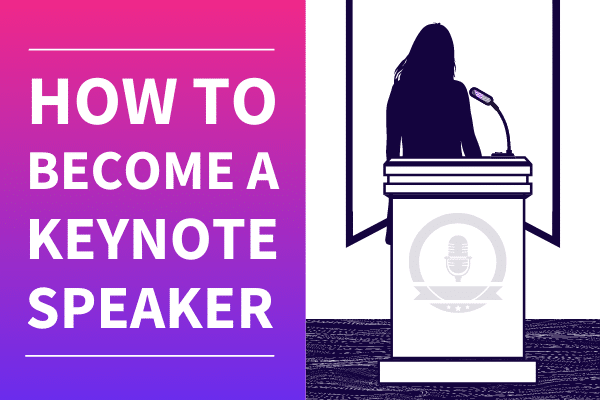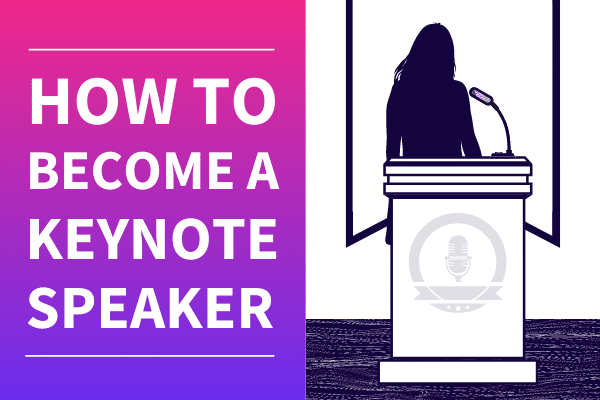How To Become A Keynote Speaker
To become a keynote speaker, obtain expertise in a specific field and cultivate strong public speaking skills.

Credit: speakerflow.com
Discover Your Passion
Identifying your passion is the first step towards becoming a successful keynote speaker. It is crucial to have a strong sense of purpose and enthusiasm for the subject you intend to speak about. Passion is what fuels your speaking, captivating your audience and leaving a lasting impact. So, how can you discover your passion and align it with your speaking career?
Identify Your Area Of Expertise
Start by identifying your area of expertise. What are you truly knowledgeable and passionate about? Consider your professional background, personal experiences, hobbies, or any specialized skills you possess. This will help you narrow down your focus and determine the topics you can confidently speak about.
Consider creating a table to list your areas of expertise along with brief descriptions, making it easier to assess which topics resonate with you the most.
| Area of Expertise | Description |
|---|---|
| Marketing | Extensive knowledge in digital marketing strategies and consumer behavior. |
| Leadership | Experience in leading and developing high-performing teams in various industries. |
| Entrepreneurship | Successful track record of starting and scaling businesses with innovative ideas. |
Explore Different Speaking Styles
Once you have identified your area of expertise, it’s essential to explore different speaking styles to find the one that suits you best. Each speaker has their own unique style, and finding yours will not only enhance your delivery but also make you stand out from the crowd.
- Watch and study renowned keynote speakers to observe their speaking styles and techniques. Take note of what resonates with you.
- Experiment with different speaking styles, such as storytelling, motivational, informative, or persuasive speaking.
- Seek feedback from trusted individuals who have observed your speaking abilities. Their insights can help you identify your strengths and areas for improvement.
Remember, discovering your passion and finding your unique speaking style takes time and self-reflection. Don’t rush the process. Embrace the journey and allow yourself to evolve as a keynote speaker. Your passion will shine through, captivating your audience and making a lasting impact.
Develop Your Speaking Skills
One valuable way to develop your speaking skills is by joining Toastmasters or a public speaking group. These organizations provide a supportive environment where you can practice speaking in front of others and receive constructive feedback. By regularly attending meetings and participating in speaking opportunities, you can build confidence and refine your delivery. In addition, you’ll have the chance to observe and learn from more experienced speakers.
To become a keynote speaker, it’s crucial to practice speaking in front of an audience. By regularly exposing yourself to this experience, you can become more comfortable and polished in your delivery. Arrange opportunities to speak, such as presenting at local events, workshops, or even volunteering as a speaker at community gatherings. Remember that each speaking engagement is an opportunity for growth, so embrace the chance to learn from each experience.
Build Your Personal Brand
When it comes to becoming a successful keynote speaker, building your personal brand is crucial. Your personal brand is what sets you apart from other speakers and positions you as an expert in your field. By defining your unique selling proposition and creating a professional online presence, you can establish yourself as a sought-after keynote speaker. Here are some steps to help you build your personal brand.
Define Your Unique Selling Proposition
Defining your unique selling proposition (USP) is the first step in building your personal brand as a keynote speaker. Your USP is what makes you stand out and attracts clients. It could be your expertise in a specific industry, your captivating storytelling skills, or your ability to inspire and motivate others. By identifying your USP, you can focus your messaging and target the right audience.
Create A Professional Online Presence
Your online presence plays a significant role in establishing your personal brand as a keynote speaker. It’s essential to have a professional website that showcases your expertise, experience, and the value you provide as a speaker. Ensure your website design is clean and visually appealing, with easy navigation and clear calls-to-action.
Optimize your website content with relevant keywords and phrases related to your niche to improve its search engine visibility. This will help potential clients find you when searching for keynote speakers. Utilize an engaging bio to convey your unique selling proposition and highlight your accomplishments and notable speaking engagements.
Alongside your website, leverage social media platforms to amplify your personal brand. Establish a presence on platforms like LinkedIn, Twitter, and Facebook, where you can share valuable industry insights, engaging content, and updates about your speaking engagements. Interact with your audience, respond to comments, and participate in relevant industry conversations.
Creating and promoting high-quality content is another effective way to build your personal brand as a keynote speaker. Write blog posts, record podcasts, or create videos that showcase your expertise and provide value to your audience. Share this content on your website and social media channels to establish yourself as a thought leader in your industry.
Building your personal brand is an ongoing process that requires consistency and effort. As you define your unique selling proposition and create a professional online presence, remember to maintain authenticity, engage with your audience, and continually refine your messaging to stay relevant in the ever-evolving speaking industry.

Credit: thought-leader.com
Network And Establish Connections
Establish connections with industry professionals and organizations to enhance your chances of becoming a keynote speaker. Networking is key to building a reputation and finding opportunities to showcase your expertise.
Attend Industry Conferences And Events
Attending industry conferences and events is a crucial step in becoming a successful keynote speaker. These gatherings provide you with valuable opportunities to network and establish connections with key players in your niche. By attending such events, you’ll be able to immerse yourself in the industry, gain insights from experts, and showcase your expertise to potential clients and event organizers alike.
When attending conferences and events, be proactive in introducing yourself to others and initiating conversations. Start by researching the attendees and speakers in advance, so you can tailor your approach and make meaningful connections. Make sure to exchange contact information and follow up with a personalized message within a few days, expressing your interest in staying connected.
Tips for attending industry conferences and events:
- Prepare beforehand: Review the event agenda, identify sessions and workshops that align with your expertise, and come prepared with questions for the speakers and panelists.
- Engage in conversations: Don’t be afraid to join conversations and discussions during sessions or breaks. This will help you connect with like-minded professionals and showcase your knowledge.
- Promote your expertise: Utilize social media platforms to share your experience and insights from the event. Engage with other attendees online and consider contributing to relevant industry discussions.
- Attend after-events: Many conferences have additional networking events or parties after the main sessions. Take advantage of these opportunities to build relationships in a more relaxed setting.
Connect With Other Speakers And Event Organizers
Connecting with other speakers and event organizers is essential for growing your career as a keynote speaker. These connections can lead to collaboration opportunities, referrals, and invitations to speak at future events. Building relationships with your peers in the speaking industry can provide valuable support, mentorship, and a platform to exchange ideas.
Here are some effective ways to connect with other speakers and event organizers:
- Attend speaker networking events: Look for networking events specifically designed for speakers or search for opportunities to meet other speakers. These events are an excellent way to connect with industry professionals and share experiences.
- Utilize social media platforms: Use social media platforms like LinkedIn, Twitter, and Facebook to reach out to other speakers and event organizers. Engage in conversations, share valuable content, and interact with their posts to establish connections.
- Request introductions: If you have a colleague or contact who is already established in the speaking industry, ask them to introduce you to other speakers or event organizers who might be beneficial for you to connect with.
- Offer value: When reaching out to others, offer something of value to them such as sharing their content, providing feedback, or suggesting collaboration opportunities. This will make your connection request more compelling.
Establishing connections with other speakers and event organizers is an ongoing process. Remember to nurture these relationships over time by staying in touch, supporting their work, and offering your expertise whenever possible. Building a strong network within the industry will not only increase your visibility but also open doors to new opportunities as a keynote speaker.
Market Yourself As A Speaker
Learn how to market yourself as a successful keynote speaker and take your speaking career to the next level. Discover effective strategies and techniques to showcase your expertise and attract opportunities in this competitive field.
Create A Compelling Speaker Bio
A well-crafted and compelling speaker bio is crucial for marketing yourself effectively as a keynote speaker. It serves as your introduction, highlighting your expertise, experience, and accomplishments. When creating your speaker bio, keep the following tips in mind:
- Keep it concise and captivating: Highlight the most relevant and impressive aspects of your background. Aim for a bio that is no more than three paragraphs long, focusing on the unique selling points that make you stand out.
- Show, don’t tell: Instead of simply listing your achievements, share anecdotes or specific examples that demonstrate your expertise and captivate the reader’s attention.
- Use engaging language: Craft your bio using captivating language that reflects your personality as a speaker. Avoid dull or generic words and instead choose vibrant and lively language that grabs the reader’s attention.
- Include testimonials: If you have received positive feedback or testimonials from previous speaking engagements, consider incorporating them into your bio. This will lend credibility and showcase the impact you have made on audiences.
Proactively Seek Speaking Opportunities
One of the keys to becoming a successful keynote speaker is proactively seeking and securing speaking opportunities. Here are some strategies to help you land more speaking gigs:
- Define your target audience: Identify the specific industries, organizations, or events where your expertise would be most valuable. This will enable you to focus your efforts on reaching out to the right people.
- Create a speaker website or portfolio: Having an online presence that showcases your expertise, speaking topics, and past engagements is essential. A well-designed website or portfolio will serve as a powerful marketing tool that prospective clients can easily access.
- Establish a strong social media presence: Utilize platforms like LinkedIn, Twitter, and Facebook to connect with event organizers, industry influencers, and potential clients. Regularly share insights, industry news, and updates about your upcoming speaking engagements to build credibility and attract attention.
- Network and build relationships: Attend industry conferences, seminars, and networking events to connect with professionals who can help you secure speaking opportunities. Engage in meaningful conversations, exchange contact information, and follow up with personalized messages to foster relationships.

Credit: www.linkedin.com
Frequently Asked Questions Of How To Become A Keynote Speaker
How Can I Become A Keynote Speaker?
To become a keynote speaker, you should start by identifying your passion, gaining expertise in your field, building a compelling personal brand, and networking with event organizers.
What Skills Do I Need To Be A Successful Keynote Speaker?
Successful keynote speakers possess excellent communication skills, the ability to connect with their audience, storytelling proficiency, expertise in their area, and the confidence to captivate and inspire others.
How Can I Find Speaking Opportunities As A Keynote Speaker?
To find speaking opportunities, utilize social media platforms, join professional associations and organizations, apply to conferences and events, network with event planners, and create an online presence through a website or blog.
Conclusion
To become a keynote speaker, you need to cultivate a variety of skills and strategies. By defining your niche, honing your public speaking skills, building a strong personal brand, and seeking out speaking opportunities, you can establish yourself as a sought-after speaker in your industry.
Remember, success doesn’t happen overnight, but with dedication and persistence, you can achieve your goals and inspire audiences with your knowledge and expertise. Keep striving and never stop learning and growing to become the best keynote speaker you can be.


